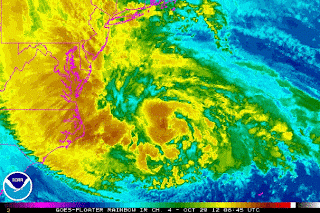That’s the Facebook heading this morning on a link to an article
about a conservative preacher who is blaming Hurricane Sandy on gays and
lesbians.
Chaplain John McTernan (and I can’t quite figure out where
the title comes from) opens a
blog post with this broadside: “God is
systematically destroying America.” He goes on to recite the litany of drought,
heat and major storms of the past year or so, pausing to note that “last
August, Hurricane Isaac hit New Orleans seven years later, on the exact day of
Hurricane Katrina. Both hit during the week of the homosexual event called
Southern Decadence in New Orleans!”
In the manor of those who troll grand conspiracy waters,
McTernan is big on date coincidences, noting also that Sandy is striking
precisely 21 years after the “Perfect Storm,” and helpfully pointing out some
numerology along the way by dividing 21 into 7 X 3 to remind us of something
about the Trinity.
I do love a good “hand-of-God-conspiracy,” especially when
it comes with dates and numbers that can sound vaguely Biblical!
Sure, the guy is nuts and massively offensive, and it’s
remarkable that he can get any attention at all. I know plenty of crazy people
with nutty ideas who never make the news, so hats off to the chaplain for
figuring out how to grab attention.
But, seriously, what’s wrong with some folks?
Actually, nothing at all. In the midst of storms, most of us
become theologians of what sort or another depending, of course, on the nature
of our God and our sacred texts. While the chaplain is an offensive jerk on so
many levels, he is also just playing into the fundamentally human desire to
understand events whose power defies human scale and human control. If we stand
under some satisfactory explanation of the event then we have at least the
illusion of control. The explanation doesn’t have to be true or accurate, it
just has to provide a mental or emotional shelter from the storm.
The chaplain’s rant does not surprise me at all. Neither did
the next thing that appeared in my Facebook feed after the link to his craziness:
an
appearance by Bill McKibben laying the blame for Sandy on climate change.
"It’s really important that everybody, even those who
aren’t in the kind of path of this storm, reflect about what it means that in
the warmest year in U.S. history, ... in a year when we saw, essentially,
summer sea ice in the Arctic just vanish before our eyes, what it means that
we’re now seeing storms of this unprecedented magnitude," McKibben says.
"If there was ever a wake-up call, this is it.
I’d certainly choose that explanation over the chaplain’s,
and it does have the advantage, as an argument, of conforming to the
predictions of climate scientists. Of course, those same scientists almost
universally say that it’s impossible to identify climate change as the precise
cause of any specific weather event.
I believe climate change is happening and that human
activity is driving it. I also know it matters not a bit to the weather whether
or not I believe it. But whether or not climate science is correct, appealing
to it in the way that some activists do in the midst of storms is not that much
different from what the chaplain has done. Sandy is huge and beyond our
control. Any explanation provides at least an illusion of shelter from the
storm.
Just as climate activists reflect the image of scientists in
their arguments, McTernan is reflecting an image of God in his. Activists will
turn to the image of disinterested researchers and peer-reviewed scripture,
whereas McTernan lifts up an image of God reflected in the scriptures of his
people. It’s not the only image of God in scripture, to be sure and, I’d argue,
not even the prevailing one, but it is an image of God found in the Bible.
Scripture carries multiple images of God, which should come
as no surprise because scripture is written in many voices, by many authors, in
a range of social contexts over the course of centuries. Whatever one thinks
about the nature of God – the same yesterday, today, tomorrow … or the God of
process theologians – it is surely in the nature of human beings to lift up the
image of God that most conforms to their own worldview. Moreover, the nature of
human being – if one can speak of “human nature” at all – is surely complex and
contradictory, and thus it should come as no surprise that the Bible is also
complex and contradictory.
As my friend
Tim Beal put it in his recent book, “The deep
biblical contradictions between liberation and oppression, love and hate, cure
and poison, are also deep within us” (
TheRise and Fall of the Bible, p. 160).
Tim makes that observation just before asking, “Why is there
undeserved suffering in this world? This is not a problem for nontheological
people, who can justifiably respond, why wouldn’t there be?”
Why is Sandy blowing the hell out of the East Coast today?
Why have more than 60 people been killed by this storm? Storms make theologians
of us all, because we all want a more satisfying answer than, “why not?”

